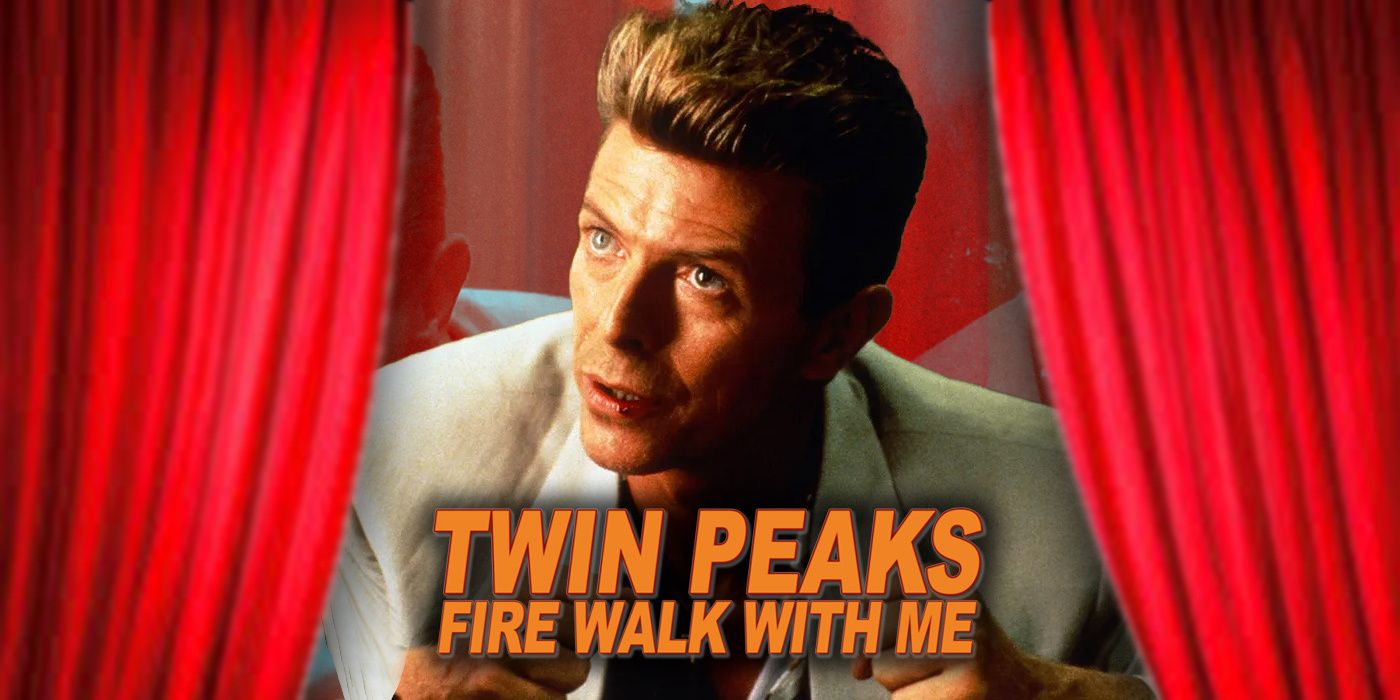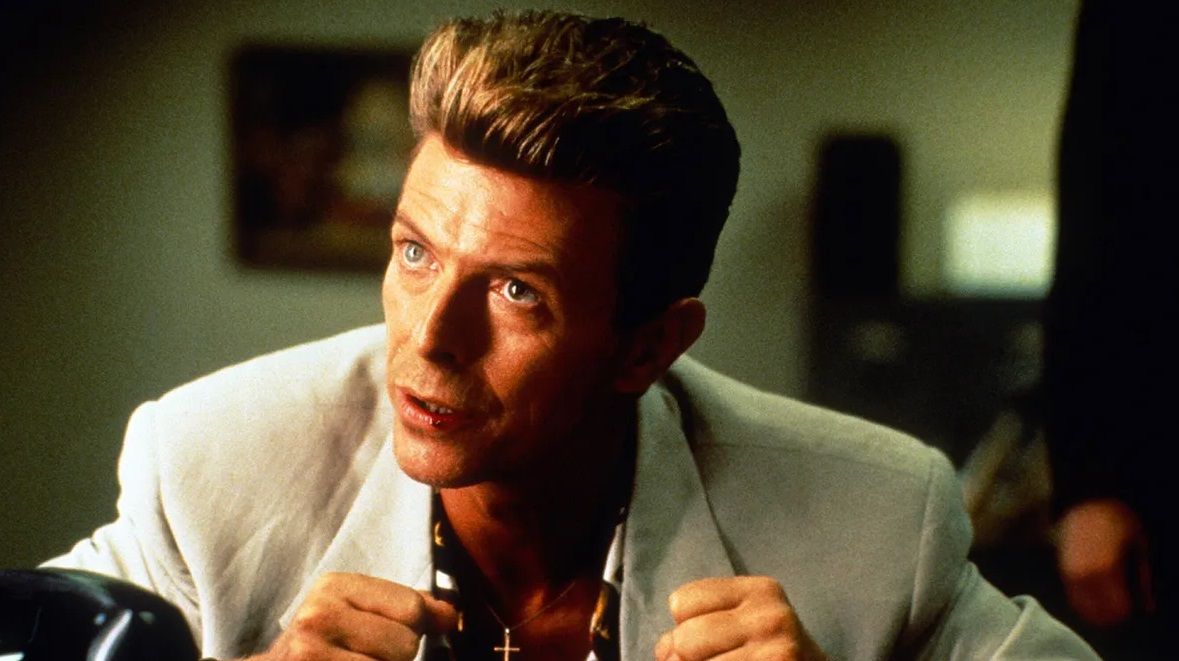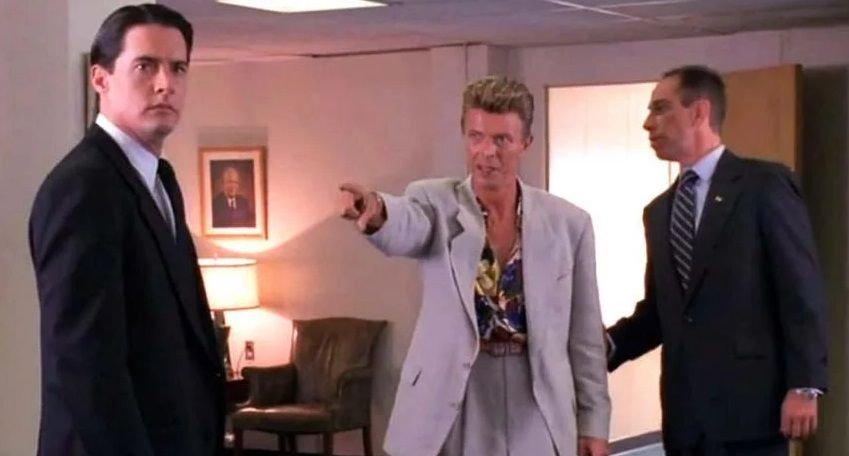David Lynch is a strange visionary who is known to create a fright or two in his films -- from the Winkies dumpster hobo in Mulholland Drive to just about any moment in Eraserhead. Lynch is a master at using his imaginative eye to create stark images of surrealism and horror. But of all the moments of dread and unease littered throughout his filmography, perhaps no other feels as confusing, unpredictable, and downright terrifying as the brief-but-unforgettable introduction of Philip Jeffries (David Bowie) in 1992's Twin Peaks: Fire Walk with Me. The controversial Twin Peaks prequel/sequel already acts like a horror film in a more traditional way compared to the rest of his work, but this short scene is so effective because of how disjointed its feels through its presentation, the performances by Bowie and Kyle MacLachlan, and the ambivalently disturbing ideas that are implied about mortality, self-control, and the inability to escape from chaos.
The Philip Jeffries scene lasts only a little over four minutes, and yet it’s a moment that has transcended in meaning for both fans of the show and in Lynch’s creativity as a storyteller. He wrote the film without the involvement of series creator Mark Frost, a fact that's fairly evident in practically every moment. The scene opens on a somewhat familiar note at FBI headquarters, with Special Agent Dale Cooper (MacLachlan) entering the frame. Cooper reminds his boss Gordon Cole (Lynch) that this specific moment in time (“10:10 a.m. on February 16th”) corresponds with a dream he had, before walking out to test the delays on the security cameras.
You can already get a sense of the conventions Lynch is playing around with in this scene even before Bowie makes his dramatic entrance. In a post Return-world, it’s easy to forget that Fire Walk with Me was maligned by audiences because it played against the expectations that fans were hoping for with a Twin Peaks movie. There’s no grand entrance for Cooper’s introduction, nor a trace of any memorable motifs from the original series. Instead, we get a minimal score with light, scratchy sounds that allude to the weirdness that’s about to occur. Audiences were already caught off-guard by the film’s offbeat focus on Agent Chet Desmond (Chris Issak) during its first act, and their discomfort likely intensified when a fan-favorite character from the original series finally appears in such an unorthodox way. Whatever nostalgia Cooper's arrival brings is quickly upended by technical choices that are subliminally telling the audience that this is not the Twin Peaks they knew before. This is something different -- something more mysterious. Cooper walks back and forth from the security cameras until he notices that the feed is frozen on his curious, gloomy stare. The light scratches in the soundscape become more apparent.
And then it happens.
Philip Jeffries walks out of the elevator as if he was pulled from some other fabric of reality, and, in the building, the scene immediately shifts from being eerie to downright petrifying. Jeffries' vague, rambling comments about leaving “Judy” out of whatever’s going on is disorienting, putting the audience in a state of narrative confusion similar to the one Jeffries himself is in. Before Cooper, Cole, the always skeptical Albert (Miguel Ferrer), and the audience can learn what Jeffries has been up to during the two years he was missing from the Bureau, the spirits of the Black Lodge begin to statically bleed into the screen, hijacking the scene almost entirely. We hear snippets of Jeffries saying that he “found something” while being in their meetings above “a convenience store,” while the haunting jazz score plays throughout all the succinct madness that’s on display.This moment is intercut with lines and footage of known Black Lodge residents such as The Man From Another Place (Michael J. Anderson, spouting lines like “Garmonbozia” and talking about the infamous ring at the center of Fire Walk With Me), BOB (Frank Silva), and the Jumping Man (Carlton Lee Russell), the red-suited, electricity-loving entity that could only come from the darkest and most disturbing depths of nightmares.The scene cuts to footage of telephone poles as we hear from Cole that Jeffries has disappeared, with Albert getting word from the front desk that he was never actually there.
Though the scene is short, it’s emotionally overwhelming to process for even multiple viewings. Lynch’s skills feel like they’re put to the test here, with hard cuts and dissolves to random settings and characters playing to his advantage as he builds a purposefully confusing sequence about a man caught between realities. That it works so well can largely be attributed to Lynch as a filmmaker, though the performances by both Bowie and MacLachlan deserve praise as well. Though Philip Jeffries would appear again in a different form in Twin Peaks: The Return, this would be the only time the character is played by Bowie, who comes off as both captivating and sympathetic. Bowie carries himself with age and pain in this scene, showing Jeffries as living proof of what a person can look, sound, and act like when tasked with investigating something as unknown and mind-shattering as the Black Lodge. The few lines that we get to hear from him (in both the theatrical version of FWWM and its companion piece, The Missing Pieces) show that Jeffries is confused and frightened about what he’s seen -- a medium lost in time who points his hands in the air and screams despite the fact that nothing seems to be harming him. MacLachlan, who's always so good, also shows an impressive level of uncertainty throughout the scene, at first frantically calling for Gordon when Jeffries appears on the camera feed before becoming confused by the fact that Jeffries seems to know who he is, even though the two had never met (a clever hint towards their roles post-FWWM).
The interpretations one can make about Lynch's works always come with a bit of uncertainty. While the themes of Fire Walk with Me seem clear at times, the true meaning behind them remains somewhat flexible. The Black Lodge is a place that exists outside the Twin Peaks world, where it's implied that impermanence and the flow of time itself are simply not applicable. Philip Jeffries exists at that moment as a walking cautionary tale for messing with the ethereal world. He is, like Laura Palmer (Sheryl Lee) throughout most of the film, a presence who is unable to escape from the anarchic forces that hold a grip on the hyper-normal, and he's both a courier and a vessel for the world that is beyond human comprehension. It’s an interpretation that feels right in line with other classic works by the surrealist auteur, but it simply hits differently in a scene like this because of the unsettling conclusions that can be made from it. One can only imagine what kinds of actions could have happened to Jeffries after that confrontation, and that’s scarier than literally anything else that we could see on the silver screen. The scene is a brief yet masterful sequence that strongly encompasses the elements that make Lynch not only a unique filmmaker, but a true master of abstract horror as well.



